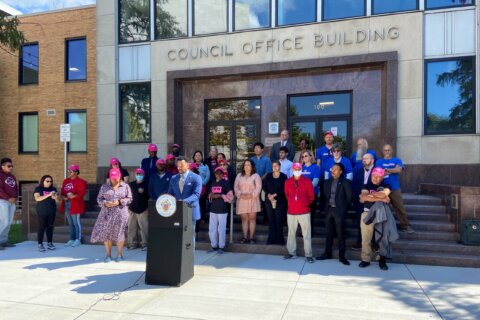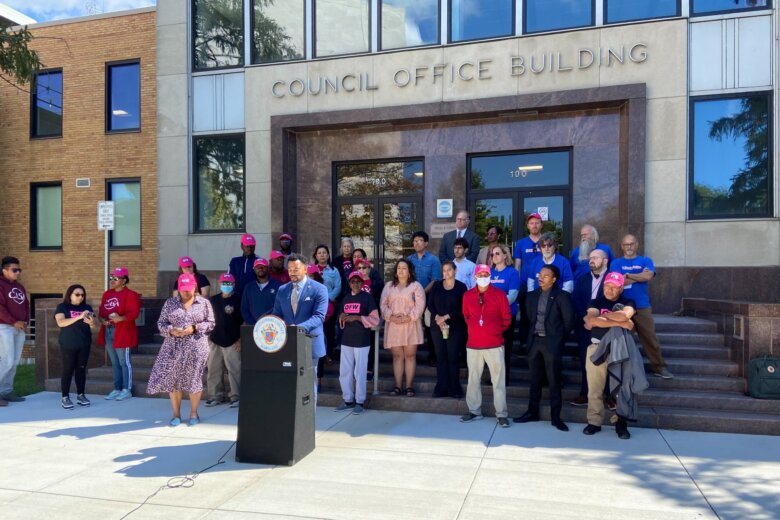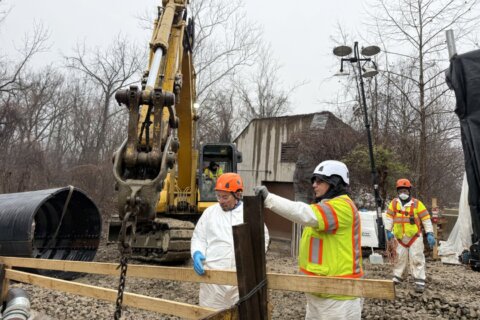
Tipped workers, such as restaurant servers, would see their hourly pay increase under a bill now under consideration by the Montgomery County Council in Maryland.
On Tuesday, Council members Will Jawando and Kristin Mink co-sponsored legislation to increase the tipped minimum wage in the state’s largest county. At a news conference shortly after introducing Bill 3523, Jawando called the action an “enormous step forward” for the nearly 15,000 tipped workers in Montgomery County.
Under the proposal, the county’s tipped minimum wage would increase by $2 every year until it reached the regular minimum wage. Tipped workers are currently only required to be paid $4 per hour before tips in the county.
The introduction comes after D.C. voters last year approved a measure that eliminated the city’s tipped-wage system. It passed four years after the D.C. Council overturned an identical measure, according to The Associated Press.
The Montgomery County bill, though, is still subject to a public hearing scheduled for October and has to be approved by the county’s full council. Critics of the measure suggest it could result in increased prices for customers, as business owners cover the cost of the increased pay.
“No one should have to go hungry or miss rent because they had a bad night in tips,” Jawando said. “It’s unconscionable, but for far too long, our tipped workers have been left behind.”
As he stood in front of representatives from the National Women’s Law Center and the group One Fair Wage, among others, Jawando said some county restaurants are already paying tipped workers what he called “a fair wage.”
And leaders in Prince George’s County are expected to introduce similar legislation later this month, Jawando said.
“Don’t believe the hype that you can’t have a great restaurant industry and pay workers a fair wage,” Jawnado said. “It’s not true — you can do both.”
Neshal Miller, a former restaurant worker in Maryland, said that while tips during the holidays are better, they’re not sufficient to live off of the rest of the year.
“It’s based on a person understanding that you work hard every day, you’re trying to support your family, you’re trying to afford rent and other things, health insurance, all those things take place,” Miller said. “Not having a set wage really creates disparities for individuals like myself and others who work in the restaurant industry.”
Jawando detailed some of those disparities during his news conference, explaining that “the sub-minimum wage is rooted in racial injustice.”
However, some business owners said the cost of menu items will likely increase if the measure is passed and they have to pay tipped workers more. Ronnie Heckman, owner of Caddie’s on Cordell in Bethesda, called the proposed bill “a solution to a non-problem.”
If the bill passes, Heckman said the consequence will be “massive price increases across the board.”
“Take your 12 or $14 hamburger, or $15 plated wings or your $20 steaks, and add 30% to it,” he said. ” … Maybe that iced tea or Diet Coke to-go, instead of it being $1.50 (or) $2, it’s now $4.”
Asked about customers who fear paying more if the bill passes, Jawando said he understands those concerns, and acknowledged some people may move their businesses out of the county as a result.
“There’s always the threat that when you raise wages, people are going to move because of the cost of doing business,” Jawando said. “We have a thriving restaurant industry here. We will continue to have a thriving restaurant industry.”
In a statement, the Restaurant Association of Maryland pointed to a tip credit repeal bill that the General Assembly considered but didn’t pass, “because of strong restaurant industry opposition and scores of servers who urged lawmakers to reject it because they make significantly more money under the current tipping system.”









